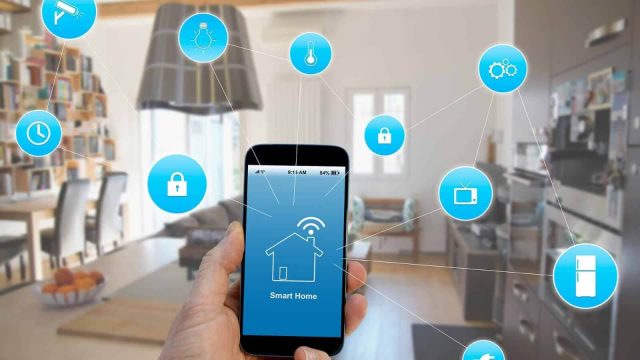If you glance at most living room coffee tables, you’ll see an arsenal of remotes: one for the TV, another for the cable box, another for the Blu-Ray player, and maybe even for the connected home lighting system. A smart remote can replace all these and more, allowing you to easily control your entertainment systems with just one device. The best options work with various devices and connect to home assistants.
Voice Control
Voice control provides a hands-free way to control home entertainment and smart home systems. It can be integrated into various devices, including streaming media streamers, TVs, and AV receivers. It can also be incorporated into proper treatments like acoustic panels, bass traps, and diffusers to optimize room acoustics for a more balanced and immersive audio experience.
Universal Remotes
If you have a serious home theater setup complete with an A/V receiver, multiple TVs, an Ultra HD 4K Blu-ray player, and gaming consoles (and perhaps a few streaming devices), you need a powerful universal remote that can take control of all of those components. These are often PC-programmable, which means you can use a computer to enter the device codes for all of your electronics, then download those commands into your remote. However, this method takes more time and is less user-friendly than auto-programming. Some models also include an IR blaster so you can still control your entertainment devices without the need for line-of-sight, and many offer a companion app that helps with setup. The more sophisticated ones can support a more significant number of devices and can even work with smart home voice assistants. Some also offer the ability to create customized activities that action multiple commands with one button.
Smart Lighting
Streamline your home theater experience with smart lighting control. Instead of straining your eyes over many remote control buttons in the dark, you can open an app on your smartphone and get to work. You can also install tunable LED light strips, decorative wall sconces, and column lighting to add an ambiance to your media room. Some smart lights have an entertainment sync feature that will automatically switch the color of your lights based on what you are watching on the TV. If there’s an explosion on screen, the room will light up in yellows and oranges, adding to the immersive experience. You can also use smart plugs and power strips to convert any standard electrical outlet into a smart one. These are great for lamps, plug-in fans, popcorn machines, window AC units, and more. If you want a more hands-free approach to smart lighting, try adding motion sensors and smart light switches.
Smart Home Hubs
Most smart home devices run on different communication protocols. You’ll need a hub to tie them all together unless you use a single device that works with multiple ecosystems (like a smart TV). Smart home hubs pack all the necessary radios to suck up devices from the most famous ecosystems, making them an essential piece of hardware for anyone with many devices in their smart home. Smart speakers have also started to act as smart home hubs, connecting devices with software through their works. They’re much more affordable than a full-on hub, but they can’t handle the more complex automation that smart home hubs are capable of.
Resources:
https://www.makeuseof.com/what-you-can-do-with-home-theater-remote-app/
https://www.techhive.com/article/599621/how-to-use-your-mobile-device-to-control-your-home-theater.html
Follow Technoroll for more!
Editorial Staff of the TechnoRoll, are a bunch of Tech Writers, who are writing on the trending topics related to technology news and gadgets reviews.




